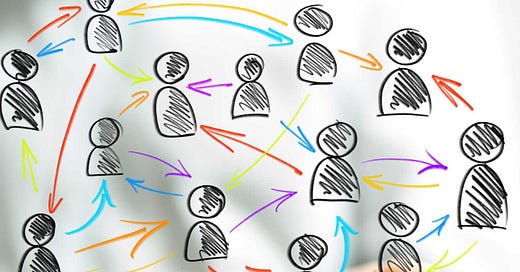I used to use the words “community” and “network” interchangeably.
But I have learned that while they are similar, they are not the same. There is a lot of misconceptions about the two. To set the record straight, here’s my deep dive into communities and networks.
I saw this posted on LinkedIn:
“🔥Most groups that call themselves 'communities' are just branded networks fuelled by self-interest or audiences united by shared objects of attention.”
It raises two interesting points.
One, there’s a lot of buzz around the word “community” in the business world, a lot of which feels completely divorced from actually building good relationships. I agree.
Two, networks are lower order, sh*ttier versions of communities. I don’t agree.
So, what is a community?
A community is a unified body of individuals, such as people with common interests living in a particular area or a body of persons of common and especially professional interests scattered through a larger society.
(Merriam-Webster Dictionary)
Some of the themes here are that the group is unified, has common interests and has some sort of proximity, often geographic.
Beyond the dictionary definitions, communities are more bounded than networks. You are in or you are out. You belong or you don’t. Being part of a community forms part of your identity. If you were to map the relationships, they are stronger, closer ties.
What is a network?
A network is an interconnected or interrelated chain, group, or system
(Merriam-Webster Dictionary)
You can have a network of computers, a network of blood vessels, a network of people. We’re going to focus on people. It’s interesting that networks of all types work in similar ways (perhaps a deep dive for another time?).
Often, networks are conflated with networking and social networks (aka social media). Meaning, they are seen as self interested, extractive, and surface level. I have a whole article on why networks are not the same as networking, you can read that here.
Network leader Kellyx Nelson explains,
“We’re afraid to say how important relationships and trust are…but the relationship building is where the magic happens. The relationships lead us to look for the ‘yes.’
(Impact Networks, by David Ehrlichman).
Networks are less centred around identity and belonging and more focused on building bridges across a range of goals and identities to cultivate trust and to find our common purpose.
While networks are usually more structured than communities, they don’t have to be rigid and transactional. Ideas emerge from within the network and shape their trajectory.
Networks can be made of strong ties (represented by short lines on the network map above), they can also be made up of “weak ties” or more informal, tangential relationships. There can be multiple nodes (represented by the big purple dots) and peripheries (represented by the blue, green, and red dots.
Networks tend to work better at scale, because of the ability to incorporate nodes and tend to be better at tackling complex and fast moving problems.
How are they similar?
Both communities and networks are relational approaches. This means that trust, collaboration, longevity are prioritised over short-term or transactional gains.
This differs from the hierarchical pyramid, which is the form of organising we are most familiar with today, especially in the West. In both communities and networks, there can be core groups of people who are more involved than others but there is not a rigid hierarchy. Both communities and networks can be formal or informal, organic or designed.
Which do you need?
Should you build a community, a network, a pyramid, combo?
As a rule of thumb:
If your goal is social connection, you may want to develop a community. 🌱
If your goal is collective action, you may want to develop a network. 🌐
If your goal is to solve a well defined issue, with a clear solution, you may want to employ a pyramid structure. 🔺
However, there is no easy answer. A lot depends on your mission and speaking with your stakeholders/ participants to find out what they are looking for.
Following our podcast interview, Jake Carroll described this is a wonderfully succinct way:
“Communities are magnets.
Networks are propellants.
Communities pull people in around shared interests.
Networks push ideas out, connecting diverse perspectives along the way.”
With the world in polycrisis, we need collective action more than ever. We need information to flow across boundaries. We need to re-build trust.
I may be biased, but we need networks.
Would love to hear what you think, what is a community? what is a network? Let me know in the comments!







How about a network of communities? https://hylo.com
great points made-i have been thinking about fashion communities.networks and their differences